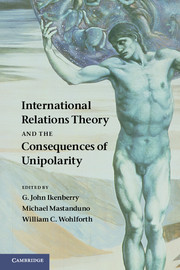Book contents
- Frontmatter
- Contents
- Figures
- Tables
- Notes on the contributors
- Notes on the editors
- 1 Introduction: unipolarity, state behavior, and systemic consequences
- 2 Unipolarity, status competition, and great power war
- 3 Legitimacy, hypocrisy, and the social structure of unipolarity: why being a unipole isn't all it's cracked up to be
- 4 Alliances in a unipolar world
- 5 System maker and privilege taker: US power and the international political economy
- 6 Free hand abroad, divide and rule at home
- 7 The liberal sources of American unipolarity
- 8 Unipolarity: a structural perspective
- 9 Unipolarity and nuclear weapons
- 10 From unipolarity to multipolarity: transition in sight?
- 11 Sell unipolarity? The future of an overvalued concept
- Index
- References
7 - The liberal sources of American unipolarity
Published online by Cambridge University Press: 05 June 2012
- Frontmatter
- Contents
- Figures
- Tables
- Notes on the contributors
- Notes on the editors
- 1 Introduction: unipolarity, state behavior, and systemic consequences
- 2 Unipolarity, status competition, and great power war
- 3 Legitimacy, hypocrisy, and the social structure of unipolarity: why being a unipole isn't all it's cracked up to be
- 4 Alliances in a unipolar world
- 5 System maker and privilege taker: US power and the international political economy
- 6 Free hand abroad, divide and rule at home
- 7 The liberal sources of American unipolarity
- 8 Unipolarity: a structural perspective
- 9 Unipolarity and nuclear weapons
- 10 From unipolarity to multipolarity: transition in sight?
- 11 Sell unipolarity? The future of an overvalued concept
- Index
- References
Summary
Introduction
The United States emerged from the end of the Cold War as the world's first unipolar state. The global distribution of power was new and distinctive. The collapse of the Soviet Union had resulted in an international system dominated by a single state. In previous eras, the global distribution of power tended to be multipolar – that is, shared among several major states. During the Cold War, the global distribution of power was bipolar. Material capabilities were concentrated in the hands of the two superpowers. But beginning in the 1990s, the global system suddenly became unipolar. An international system is unipolar if it “contains one state whose overall share of capabilities places it unambiguously in a class by itself compared to all other states.” Over the last two decades, the United States has stood above other states with unrivaled and unprecedented material capabilities – military, technological, economic, political.
This volume probes the “effects” of unipolarity on world politics. That is, it begins with an observation about the distribution of material capabilities and explores its “impact” on the relations among states. Power is defined in terms of material capabilities rather than in terms of influence or outcomes. As such, we are interested in how a unipolar distribution of power affects the grand strategies of the unipolar state, the responses of weaker and secondary states, and the overall patterns of the global system. Specific chapters look at the impact of unipolarity on alliances, grand strategy, the world economy, and patterns of conflict and cooperation. Contrasts are drawn with patterns and outcomes that emerge under conditions of multipolarity and bipolarity.
- Type
- Chapter
- Information
- Publisher: Cambridge University PressPrint publication year: 2011
References
- 2
- Cited by



